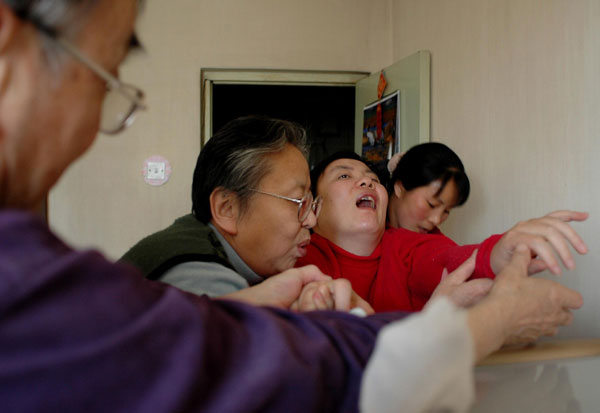

The paralyzed Zhu Ling (second right) tries to move with the help of her parents and a housemaid. Zhu was poisoned with thallium 19 years ago when she was studying at Tsinghua University in Beijing. The case has never been solved. [Photo by Lyu Jiazuo / for China Daily]
"We are worried how Huang's parents will live the rest of their lives without him," said Wang. Students from Huang's high school and university have started a collection to help the family.
Huang's academic achievements and talent were recognized by teachers and classmates, and there is a consensus that he would have gained a PhD with ease. Sadly, the case has resulted in a new online greeting among former roommates and classmates: "Thank you for your forgiveness and for not killing me during our school days."
The case has shocked the nation and reminded people of a similar event at an elite school 19 years ago.
Zhu Ling, a 21-year-old student at Tsinghua University, was poisoned with thallium, a heavy metal that had been introduced to her cup. Although Zhu survived, she has irreversible brain damage, and is paralyzed and practically blind. Several internal organs are also irreparably damaged, and she requires constant supervision and care. The case has never been solved.
A growing problem
Meanwhile, a number of incidents at other colleges have highlighted the problem of campus violence and the psychological problems that affect some students.
On April 16, a dispute between two students at Nanjing University of Aeronautics and Astronautics over an online game resulted in one fatally stabbing the other.
The following day, a student at Shazhou Professional Institute of Technology in Jiangsu province seriously injured a classmate with a knife. On the same day, a decaying corpse was discovered in a dormitory at Nanchang Hangkong University.
These cases have prompted psychology experts to urge that greater attention is paid to the psychological health of Chinese college students.


















 2 killed, 1 injured in man's street knife attacks in Beijing
2 killed, 1 injured in man's street knife attacks in Beijing


![]()
